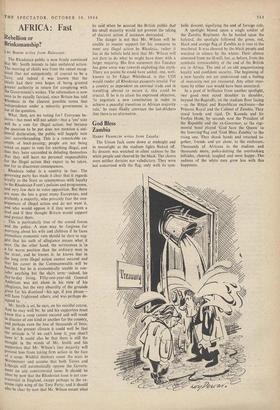AFRICA: Fast
Rebellion or Brinksmanship?
Leo BARON writes from Bulawayo:
The Rhodesian public is now firmly convinced that Mr. Smith intends to take unilateral action. The meeting of chiefs was from the outset recog- nised (but not outspokenly, of course) to be a farce, and indeed it was known that the chiefs had their own hopes of being granted greater authority in return for complying with the Government's wishes. The referendum is now seen to be equally farcical, since Britain has told Rhodesia in the clearest possible terms that independence under a minority government is out of the question.
What, then, are we voting for? Everyone be- lieves—but most will not admit-that a 'yes' vote will be a vote for illegal action; but because the question to be put does not mention a uni- lateral declaration, the public will happily vote Yes' notwithstanding. This is a remarkable ex- ample of buck-passing; people are not being asked on paper to vote for anything illegal, and thus they have succeeded in deluding themselves that they will have no personal responsibility for the illegal action they expect to be taken, nor for its disastrous consequences.
Rhodesia today is a country in fear. The governing party has made it clear that it regards loyalty to the State as synonymous with loyalty to the Rhodesian Front's policies and programme, and very few dare to voice opposition. But there are none the less a great many Europeans, and probably a majority, who privately fear the con- sequences of illegal action and do not want it, and who would oppose it if they were given a lead and if they thought Britain would support and protect them.
This is particularly true of the armed forces and the police. A man may be forgiven for Worrying about his wife and children if he faces immediate economic ruin should he dare to sug- gest that his oath of allegiance means what it
i says. On the other hand, the serviceman is n a far worse position than the ordinary man in the street, and he knows it; he knows that in the long term illegal action cannot succeed and that his career in the Commonwealth will be finished, but he is economically unable to con- sider anything but the shOrt term—indeed, his day-to-day living, Fifty-one-year-old General Anderson was not alone in his view of his allegiance, but the very absurdity of the grounds given for his, dismissal—his age, if you please— will have frightened others, and was perhaps de- signed to.
Mr. Smith is set, he says, on his suicidal course. And he may well be; he and his supporters must know that a coup cannot succeed and will result in disaster of one kind or another for the country, and perhaps even the loss of thousands of lives; but in the present climate it could well be that the attitude is 'if we can't keep• it, you shan't have it.' It could also be that there is still the thought in the minds of Mr. Smith and his supporters that Mr. Wilson's tiny majority will Prevent him from taking firm action in the face of a coup. Wishful thinkers count the seats in Westminster and assume that both Tories and Liberals will automatically oppose the Govern- ment on any controversial issue. It should be clear by now that the Rhodesian issue is not con- troversial in England, except perhaps to the ex- treme right wing of the Tory Party; and it should also be clear by now that Mr. Wilson meant what
he said, when he assured the British public that his small majority would not prevent the taking of decisive action if occasion demanded.
The danger is not that Mr. Wilson will be unable to muster support for his measures to meet any illegal action by Rhodesia; rather it lies in the beliefs held here that Mr. Wilson will not dare to do what he might have done with a larger majority. His firm statement this Tuesday has gone some way towards exploding this myth. There are points he could have added; one, well- known to Sir Edgar Whitehead, is that UDI would redder all Rhodesian passports invalid. For a country so dependent on external trade and in travelling abroad to secure it,. this could be crucial. If he is to attain his expressed objective, `to negotiate a new constitution in order to achieve a peaceful transition to .African majority rule,' he must nay convince the last-ditchers that there is no alternative.


































 Previous page
Previous page